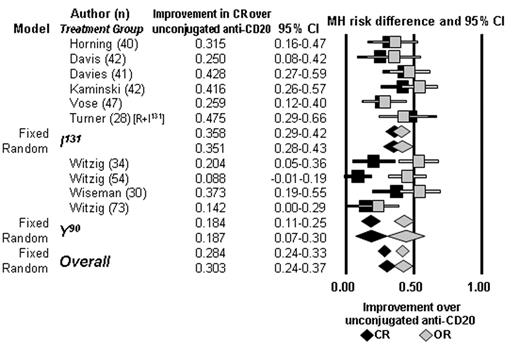Abstract
Background:Numerous treatment options are available to patients with relapsed follicular lymphoma(FL), ranging from watchful waiting to transplantation. At present, the optimal therapy for this patient population remains undefined. Single agent rituximab(R) and radioimmunotherapy(RIT) with anti-CD20 antibody linked to iodine-131 (I131 Tositumomab) or to yttrium-90 (Y90-ibritumomab tiuxetan) have emerged as well tolerated treatments for relapsed FL and other indolent B-cell non-Hodgkin’s lymphomas(NHL). In phase II and III trials, RIT has demonstrated higher rates of complete response(CR) and overall response(OR) in patients with relapsed FL. To quantify the benefit of RIT and compare this to R, We conducted a systematic review of the literature and a meta-analysis of selected studies.
Methods:As part of a broader review, we searched the Cochrane Central Register of Controlled Trials (Cochrane Library Issue 1, 2003), MEDLINE (1/1966-6/2005), EMBASE (1/1980-7/2005), American Society of Hematology Annual Meeting abstracts (2002–2004), and American Society of Clinical Oncology Annual Meeting abstracts (1995–2005). Each database was searched using combinations of the term follicular lymphoma and the terms for medications and treatment regimens. Inclusion criteria for studies were as follows: 1)Inclusion of patients with relapsed FL; 2)Treatment with RIT targeted at the CD20 antigen; 3)Original reporting in English of the following treatment outcome measures for patients with FL and/or other indolent NHL: CR/CR-unconfirmed, OR, and at least one form of survival data. Extracted data included pre-treatment disease status, patient characteristics, treatment regimen, progression free survival, overall survival, CR and OR. We utilized the Mantel-Haenszel (fixed effects model) and DerSimonain and Laird (random effects) methods to calculate the risk difference comparing the rates of CR/CRu and OR with RIT to those observed with conjugated CD20 antibody. For randomized trials of RIT the comparator in analyses was the control group from the trial. For other trials, response rates with RIT were compared to those observed with R in relapsed FL (McLaughlin, JCO 1998).
Results:Over 1800 records were reviewed with 10 articles meeting inclusion criteria with 245 patients. Nearly all studies of RIT were multi-institutional, accrued patients between 1995 and 2002, had a median patient age >50 years, and had 48%–68% male patients. Three studies did not specify the number of patients with indolent NHL by histological class. In the remainder, 65%–100% of patients had FL grade 1 or 2. The percentage of patients with FL grade 3 or transformed NHL ranged in studies from 0 to 25%. In comparison to unconjugated CD20 antibody, overall, RIT improved CR by 30% (95% CI:24%–37%) and improved OR by 42% (95% CI:35%–49%). I131- and Y90-based RIT had overlapping benefits.
Conclusions:As suggested by the individual trials, RIT can improve the likelihood of response and CR compared with R. Selecting appropriate patients for RIT will require consideration of patient factors as well as future treatment options such as transplantation and maintenance therapy that may extend the benefits of these improved response rates.
Author notes
Corresponding author


This feature is available to Subscribers Only
Sign In or Create an Account Close Modal